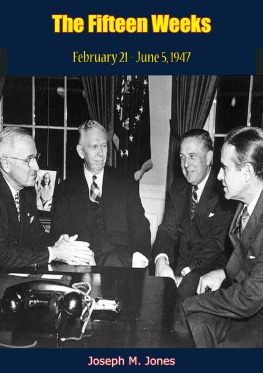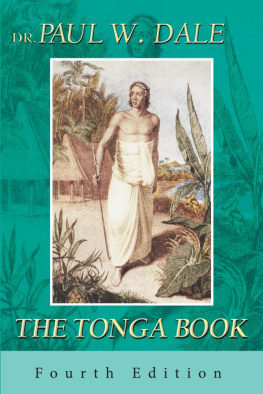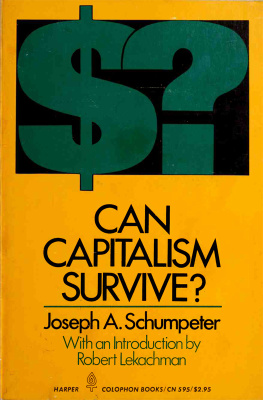Joseph M. Jones - The Fifteen Weeks (February 21 - June 5, 1947)
Here you can read online Joseph M. Jones - The Fifteen Weeks (February 21 - June 5, 1947) full text of the book (entire story) in english for free. Download pdf and epub, get meaning, cover and reviews about this ebook. year: 2018, publisher: Arcole Publishing, genre: Politics. Description of the work, (preface) as well as reviews are available. Best literature library LitArk.com created for fans of good reading and offers a wide selection of genres:
Romance novel
Science fiction
Adventure
Detective
Science
History
Home and family
Prose
Art
Politics
Computer
Non-fiction
Religion
Business
Children
Humor
Choose a favorite category and find really read worthwhile books. Enjoy immersion in the world of imagination, feel the emotions of the characters or learn something new for yourself, make an fascinating discovery.
- Book:The Fifteen Weeks (February 21 - June 5, 1947)
- Author:
- Publisher:Arcole Publishing
- Genre:
- Year:2018
- Rating:4 / 5
- Favourites:Add to favourites
- Your mark:
- 80
- 1
- 2
- 3
- 4
- 5
The Fifteen Weeks (February 21 - June 5, 1947): summary, description and annotation
We offer to read an annotation, description, summary or preface (depends on what the author of the book "The Fifteen Weeks (February 21 - June 5, 1947)" wrote himself). If you haven't found the necessary information about the book — write in the comments, we will try to find it.
The Fifteen Weeks (February 21 - June 5, 1947) — read online for free the complete book (whole text) full work
Below is the text of the book, divided by pages. System saving the place of the last page read, allows you to conveniently read the book "The Fifteen Weeks (February 21 - June 5, 1947)" online for free, without having to search again every time where you left off. Put a bookmark, and you can go to the page where you finished reading at any time.
Font size:
Interval:
Bookmark:


This edition is published by Arcole Publishing www.pp-publishing.com
To join our mailing list for new titles or for issues with our books arcolepublishing@gmail.com
Or on Facebook
Text originally published in 1955 under the same title.
Arcole Publishing 2018, all rights reserved. No part of this publication may be reproduced, stored in a retrieval system or transmitted by any means, electrical, mechanical or otherwise without the written permission of the copyright holder.
Publishers Note
Although in most cases we have retained the Authors original spelling and grammar to authentically reproduce the work of the Author and the original intent of such material, some additional notes and clarifications have been added for the modern readers benefit.
We have also made every effort to include all maps and illustrations of the original edition the limitations of formatting do not allow of including larger maps, we will upload as many of these maps as possible.
THE FIFTEEN WEEKS
(FEBRUARY 21 - JUNE 5, 1947)
AN INSIDE ACCOUNT OF THE GENESIS OF THE MARSHALL PLAN
BY
JOSEPH MARION JONES
Contents
For
Clergue and Clarissa
SINCE the early days of the Fifteen Weeks I have known that I should write this book, that some day I would write it. All who participated in the extraordinary developments of that period were aware that a major turning in American history was taking place. The convergence of massive historical trends upon that moment was so real as to be almost tangible, and it was plain that in that carrefour of time all those trends were being to some degree deflected. How much of what was sensed and felt at that moment would find its way into histories written years later wholly from dusty records? How much of the atmosphere and drama would be recaptured? Indeed, so few were the records, so unlikely the source of many of them, and so unorthodox were many of the procedures, how would historians ever be able to find out what really happened? These questions occurred to me at the time and led me to prepare myself for writing this book.
Equally compelling was the spectacle of the government of the United States operating at its very finest, efficiently and effectively, and of the American people responding to leadership in a manner equally splendid. To observe this closely was to be filled with deep pride and thanksgiving. It seemed important to describe that spectacle in detail as a pattern and as an inspiration for the future.
I am proud to say that this book was written at Yale University during my residence as a Fellow in the Department of Political Science. I am deeply grateful to those who made possible the grant which was made to me, and to the faculty and staff of the Department of Political Science for their unfailing courtesy and helpfulness.
J. M. J.
May 30, 1955
THE comfortable, dowdy old structure at Seventeenth Street and Pennsylvania Avenue, known as State, War, and Navy, was soon to lose her distinction as hostess to the Secretary of State and as center of the relations of the United States with the world. War and Navy had abandoned her long ago. Now, in early 1947, the State Department too was leaving her for new quarters, gaudier, more commodious, even air-conditioned, in a questionable part of town. After years of stubborn rearguard resistance to White House encroachments on space, the move was decidedone of George Catlett Marshalls first acts as Secretary of State. Even now files were being packed in Old State and room assignments were being made in New State at Twenty-first Street and Virginia Avenue. But on the gray Friday afternoon of February 21, 1947, Old State, unlike most of her tenants to whom the prospective parting brought anguish and a sense of personal loss, wore her regrets with silence and dignity. There was nothing that afternoon in the cables, or in circulating memoranda, or even in anybodys mind to suggest that the most revolutionary advance in United States foreign policy since 1823 would occur within the next fifteen weeks, and that the last days of State Department tenancy at Seventeenth and Pennsylvania would be a period of intense activity leading to great historical accomplishment.
Mr. Marshall had left his office earlier than usual that afternoon to go to Princeton, New Jersey, where he would the next day attend a celebration of Princetons Bicentennial, receive a degree of Doctor of Laws, and make his first public address as Secretary of State. He had been gone only a short while when the private secretary to Lord Inverchapel, British Ambassador in Washington, telephoned to request an immediate appointment. As the matter appeared urgent and Secretary Marshall was not expected to return to his office until Monday morning, Dean Acheson, Undersecretary of State, was consulted on what to do.
Acheson was reluctant to ask the Secretary to return to his office late Saturday unless it was necessary. Only a month earlier General Marshall had returned from his long and grueling mission to China, to assume immediately the burdens of his new office. In less than two weeks he was to leave for a Conference of Foreign Ministers in Moscow, which would last no one knew how many weeks or months. He deserved, Acheson thought, at least part of a weekend off if it could be managed. Inquiry at the Embassy disclosed that the Ambassador wanted to deliver to the Secretary two notes concerning a decision of the British government to end aid to Greece and Turkey. Acheson therefore arranged that H. M. Sichel, First Secretary of the British Embassy, should at once bring over copies of the notes and discuss them with Loy Henderson, Director of the Office of Near Eastern and African Affairs, and John D. Hickerson, Deputy Director of the Office of European Affairs. Whatever staff work might be required could be started over the weekend, and the Ambassador could call on Secretary Marshall Monday morning, deliver the notes formally, and discuss the problem. Meanwhile the Secretary and the President would be informed.
As Jack Hickerson had another appointment he could not break on short notice, Loy Henderson alone received Mr. Sichel forty-five minutes later. Henderson and Sichel had known each other casually for some time. This day they greeted each other cordially, but there was no preliminary badinage. Sichel drew from his dispatch case copies of two notes and handed them to Henderson, who began to read the note on Greece.
The British government recalled that previous exchanges of views had resulted in the mutual understanding that for military and strategic reasons Greece and Turkey should not be allowed to fall under Soviet control, and mentioned the informal agreement reached between Secretary of State Byrnes and Foreign Minister Bevin in Paris the previous summer that Great Britain would extend chiefly military aid and the United States chiefly economic aid, though the possibility of United States military aid to Greece had not been excluded. Greece was now in most urgent need, and the British government thought it should be decided how much economic aid the United States intended to give and what form it should take.
The Greek economic situation, the note continued, was on the point of collapse. Unless help from the outside was forthcoming there was certain to be widespread starvation and consequent political disturbances.
Next pageFont size:
Interval:
Bookmark:
Similar books «The Fifteen Weeks (February 21 - June 5, 1947)»
Look at similar books to The Fifteen Weeks (February 21 - June 5, 1947). We have selected literature similar in name and meaning in the hope of providing readers with more options to find new, interesting, not yet read works.
Discussion, reviews of the book The Fifteen Weeks (February 21 - June 5, 1947) and just readers' own opinions. Leave your comments, write what you think about the work, its meaning or the main characters. Specify what exactly you liked and what you didn't like, and why you think so.









